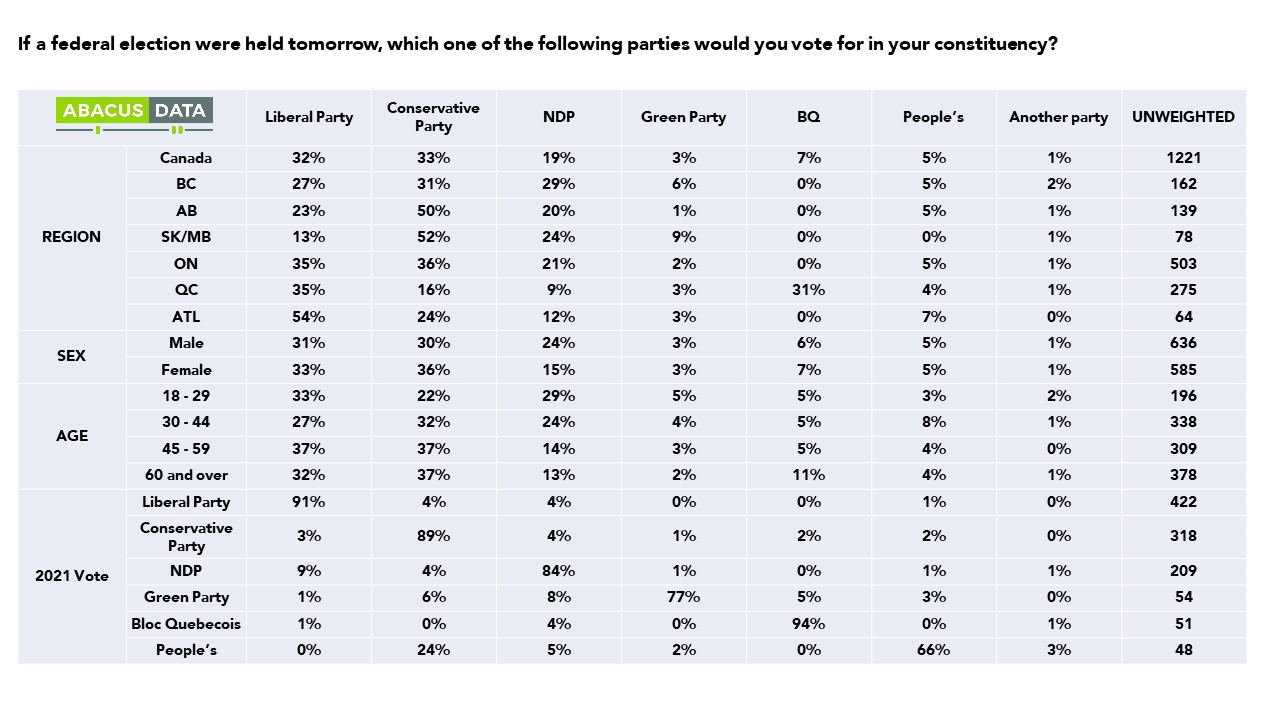Deadlocked: Liberals and Conservatives head to Fall session one point apart
September 3, 2022
We just completed a national survey of 1,500 Canadian adults from August 26 to 30, 2022.
If an election were held today, 33% would vote for the Conservative Party, 32% for the Liberal Party, 19% for the NDP and 7% for the BQ.
These numbers are all within the margin of error of the results of last year’s federal election.
The latest numbers send unclear signals to the two leading parties: Conservatives will wonder if what felt like positive momentum is dwindling, and Liberals will wonder if what felt like declining support has stopped. Only time, events, and more data over time will tell which scenario is accurate.
BC, ONTARIO, AND QUEBEC: RACES ALL TIGHT
In the three provinces that elect the largest proportion of seats to the House of Commons, the result indicate a three-way race in BC, a tied race between the Conservatives and Liberals in Ontario, and the Liberals with a narrow (4 point) lead over the BQ in Quebec. The Liberals have a wide lead in Atlantic Canada and the Conservatives have a huge advantage in the Prairies.
SATISFACTION WITH THE FEDERAL GOVERNMENT UP A FEW POINTS
While more people are dissatisfied with Ottawa’s performance, our latest numbers show modest improvement for the government, after seeing satisfaction levels deteriorate in recent months. Today, 36% are satisfied, and 49% are dissatisfied.
FEELINGS ABOUT THE PM – DETERIORATION STALLED OR STOPPED
Public feelings about Prime Minister Trudeau had been deteriorating through our surveying over the summer but the latest results show no further decline. The shift is small enough to be cautious not to over-interpret a single data point. The Prime Minister’s negatives still stand at 50% – the second highest negative reading we’ve seen during his time in politics.
JAGMEET SINGH’S APPROVAL RATING HAS WEAKENED
For the last couple of years, Jagmeet Singh has been the most popular of the federal leaders, at one time his net rating was +21 (46% positive/25% negative). Since then, his positives have slid to 34% and his negatives have risen to 31%, leaving him with a +3 net rating.
PIERRE POILIEVRE: MANY STILL DON’T HAVE AN OPINION
At the start of the Conservative leadership race, 42% had an opinion about Mr. Poilievre. Today as the race wraps up, only 49% have an opinion. During that time, his positives have always been in the 20%-22% range, and his negatives went from 22% to 27%.
UPSHOT
 According to Bruce Anderson: “As the Trudeau government heads to a Cabinet and full caucus retreat the public opinion data will provide some encouragement that the deterioration we were seeing may have stalled. At the same time, there is not much evidence of enthusiasm for the Liberals, with dissatisfaction numbers near all-time highs, including for the Prime Minister. Roughly 7 million voters are looking for something they aren’t finding right now from the Trudeau government. For the Conservatives, the numbers also are mixed tidings – this leadership race has not created any momentum for the Party, and the perceptions of the likely winner have moved the wrong way, albeit only modestly. As things stand, they are highly competitive, but not winning many new hearts and minds, despite the evident vulnerability of the Liberals.”
According to Bruce Anderson: “As the Trudeau government heads to a Cabinet and full caucus retreat the public opinion data will provide some encouragement that the deterioration we were seeing may have stalled. At the same time, there is not much evidence of enthusiasm for the Liberals, with dissatisfaction numbers near all-time highs, including for the Prime Minister. Roughly 7 million voters are looking for something they aren’t finding right now from the Trudeau government. For the Conservatives, the numbers also are mixed tidings – this leadership race has not created any momentum for the Party, and the perceptions of the likely winner have moved the wrong way, albeit only modestly. As things stand, they are highly competitive, but not winning many new hearts and minds, despite the evident vulnerability of the Liberals.”
 According to David Coletto: “The Canadian political environment continues to be deeply fragmented. The Liberals and Conservatives are deadlocked in vote intentions, disapproval with the federal government and Mr. Trudeau is higher than it has been. But at the same time, Mr. Singh’s negatives have risen while his positives have dropped. More view Mr. Poilievre negatively than positively but he’s a blank canvas to many. How Canadians who don’t know Mr. Poilievre will react to him will be what I’m watching most closely over the next few months.”
According to David Coletto: “The Canadian political environment continues to be deeply fragmented. The Liberals and Conservatives are deadlocked in vote intentions, disapproval with the federal government and Mr. Trudeau is higher than it has been. But at the same time, Mr. Singh’s negatives have risen while his positives have dropped. More view Mr. Poilievre negatively than positively but he’s a blank canvas to many. How Canadians who don’t know Mr. Poilievre will react to him will be what I’m watching most closely over the next few months.”
METHODOLOGY
The survey was conducted with 1,500 Canadian adults from August 26 to 30, 2022. A random sample of panelists were invited to complete the survey from a set of partner panels based on the Lucid exchange platform. These partners are typically double opt-in survey panels, blended to manage out potential skews in the data from a single source.
The margin of error for a comparable probability-based random sample of the same size is +/- 2.6% 19 times out of 20.
The data were weighted according to census data to ensure that the sample matched Canada’s population according to age, gender, educational attainment, and region. Totals may not add up to 100 due to rounding.
This survey was paid for by Abacus Data Inc.
Abacus Data follows the CRIC Public Opinion Research Standards and Disclosure Requirements that can be found here: https://canadianresearchinsightscouncil.ca/standards/
ABOUT ABACUS DATA
We are the only research and strategy firm that helps organizations respond to the disruptive risks and opportunities in a world where demographics and technology are changing more quickly than ever.
We are an innovative, fast-growing public opinion and marketing research consultancy. We use the latest technology, sound science, and deep experience to generate top-flight research-based advice to our clients. We offer global research capacity with a strong focus on customer service, attention to detail, and exceptional value.
We were one of the most accurate pollsters conducting research during the 2021 Canadian election following up on our outstanding record in 2019.
Contact us with any questions.
Find out more about how we can help your organization by downloading our corporate profile and service offering.











